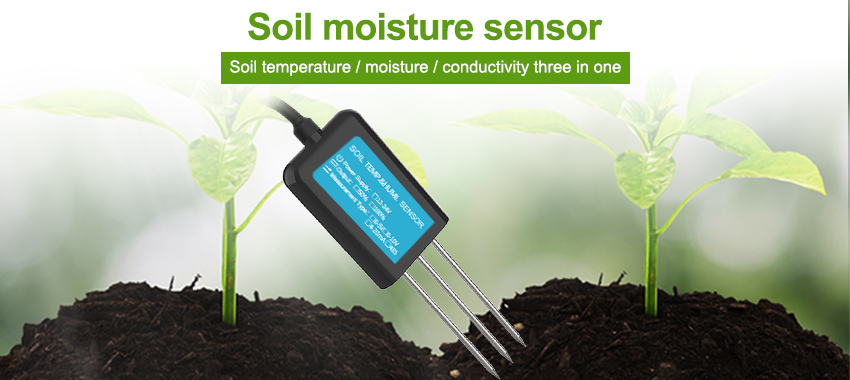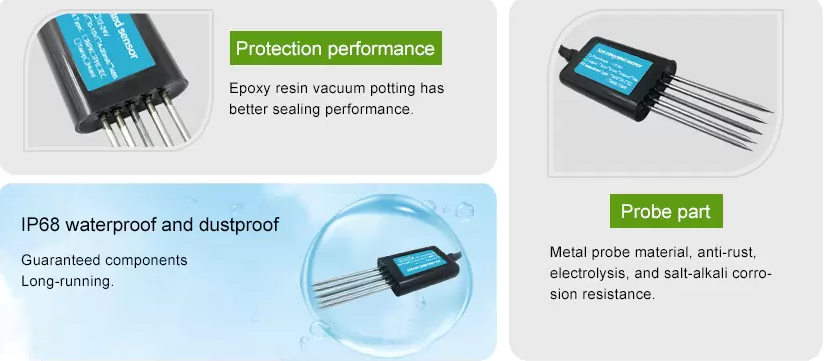soil moisture sensor module
An important aspect of precision agriculture is the use of a soil moisture sensror module, as this can have a significant impact on plant growth and yield.

Soil moisture sensor modules are essential tools in precision agriculture, allowing farmers to accurately monitor and manage soil moisture levels in real-time. In this article, we will explore the importance of soil moisture sensor modules in precision agriculture, their benefits, and how they work.
The Importance of Soil Moisture Management in Agriculture Soil moisture is one of the most critical factors affecting plant growth and yield. Too much moisture can lead to waterlogging, which restricts the supply of oxygen to the roots, causing them to die. On the other hand, insufficient moisture can lead to drought stress, which can stunt growth, reduce leaf area, and decrease the efficiency of photosynthesis.
In conventional agriculture, soil moisture levels are often managed using guesswork or visual inspections, resulting in overwatering or underwatering, both of which can lead to reduced crop yields. With soil moisture sensor modules, however, farmers can monitor soil moisture levels in real-time and make informed decisions regarding irrigation management.

Advantages of using soil moisture sensor modules for precision agriculture
- Increased Efficiency: Soil moisture sensor modules allow farmers to apply water only where it is needed, reducing waste and increasing irrigation efficiency. This can save both water and energy, as well as reducing fertilizer runoff and soil erosion.
- Improved Crop Quality: Consistent soil moisture levels throughout the growing season can improve crop quality and increase yields. By using soil moisture sensor modules, farmers can optimize irrigation schedules to support optimal plant growth and development.
- Reduced Labor Costs: Soil moisture sensor modules can automate irrigation scheduling, reducing the need for manual inspections and adjustments. This can save time and labor costs, freeing up farmers to focus on other important tasks.
- Early Detection of Problems: Soil moisture sensor modules can detect changes in soil moisture levels before they become visible to the naked eye. This allows farmers to address potential problems early on, preventing crop damage or yield loss.
How Soil Moisture Sensor Modules Work?
Soil moisture sensor modules work by measuring the amount of water in the soil at varying depths. They consist of sensors that are inserted into the soil and connected to a control unit that sends data to a computer or mobile device.
There are two main types of soil moisture sensors: capacitance sensors and tensiometers.
Capacitance sensors measure changes in electrical conductivity caused by variations in soil moisture content. When the sensor is inserted into the soil, it emits an electrical charge and measures the amount of charge returned. More water in the soil leads to higher conductivity levels, which the sensor interprets as higher soil moisture content.
Tensiometers, on the other hand, measure the tension or pressure required to extract soil moisture from the soil. Tensiometers consist of a porous ceramic cup that is installed in the soil and connected to a pressure gauge. As soil moisture levels change, the pressure required to extract moisture changes as well, allowing the sensor to indicate moisture levels.
Choosing the Right Soil Moisture Sensor Module for Your Farming Needs When choosing a soil moisture sensor module, there are several factors to consider, including:
- Soil Type: Different types of soil require different types of sensors. For example, sandy soils may require sensors that can penetrate deeper into the soil, while clay soils may require sensors with a shorter penetration depth.
- Installation Depth: Depending on the crop being grown, sensors may need to be installed at different depths to accurately monitor moisture levels. Be sure to choose a sensor that can be easily adjusted to ensure accurate readings.
- Accuracy: The accuracy of soil moisture sensors can vary, so be sure to choose a sensor with a high level of accuracy to ensure reliable data.
- Ease of Use: Choose a soil moisture sensor that is easy to use and can integrate with your existing irrigation system. Look for sensors that come with user-friendly software or mobile apps that allow you to monitor readings in real-time.
Conclusion Overall, soil moisture sensor modules play a critical role in precision agriculture by helping farmers optimize irrigation management and increase crop yields. By managing soil moisture levels more effectively, farmers can reduce waste, save time and labor costs, and improve the quality and quantity of their crops.
When choosing a soil moisture sensor module, it’s important to consider factors such as soil type, installation depth, accuracy, and ease of use to ensure that you are getting the best possible results for your farm. By investing in soil moisture sensor technology, farmers can take an important step towards sustainable and efficient agricultural practices.